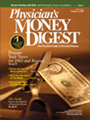Avoid the IRS Dirty Dozen
Like it or not, busy doctors are inviting targets for the IRS 2003 tax fraud “dirty dozen.†The IRS is aggressively pursuing and successfully prosecuting promoters of these schemes and many of their clients for fraud and tax evasion. Even innocent taxpayers can face a staggering amount of back interest and penalties. Avoid these common schemes:
1. Offshore transactions—Use of an offshore credit card, trust, or other arrangement to hide or under-report income or to claim false deductions on a federal tax return is illegal.
2. Identity theft—Identity thieves use someone's personal data to steal their financial accounts; apply for new loans, credit cards, services, or benefits in the victim's name; and even file fraudulent tax returns. Always be choosy about disclosing personal and financial information.
3. Phony tax payment checks—Con artists sell fictitious financial instruments to pay a tax liability, mortgage, and other debts. The false checks, called sight drafts, are worthless. It is illegal to use these sight drafts to pay a tax liability or other debts.
4. African Americans' special tax refund— Thousands of African Americans have been misled by people offering, for a fee, to file for tax credits or refunds related to reparations for slavery. There is no such provision in the tax law.
5. No taxes withheld from wages— These illegal schemes instruct employers not to withhold federal income tax or employment taxes from wages paid to their employees. Based on an incorrect interpretation of tax law, they have been refuted in court.
6. Improper home-based business— Schemers claim that individual taxpayers can deduct most, or all, of their personal expenses as business expenses by setting up a bogus home-based business. But the tax code firmly establishes that a clear business purpose and profit motive must exist in order to generate and claim allowable business expenses.
7. Paying the tax and getting the prize—The caller says you've won a prize, and all you have to do to get it is to pay the income tax due. Don't believe it— all tax payments go to the IRS.
8. Frivolous arguments—When a scheme promoter says, “I don't pay taxes—why should you?†or urges you to “untax yourself for $49.95,†beware.
9. Social Security tax scheme—For a $100 paperwork fee, plus a percentage of any refund received, a con artist promises to get back all your Social Security taxes paid. It won't happen.
10. Obtaining a big refund for a fee.—Schemers seek to borrow your Social Security number or give you a fake W-2 form and promise to split the refund with you.
11. Share/borrow earned income tax credit (EITC) dependents—Unscrupulous tax preparers share one client's qualifying children with another client in order to allow both clients to claim the EITC. The IRS prosecutes the preparers of such fraud and participating taxpayers.
12. IRS “agent†comes to your house to collect—IRS special agents, field auditors, and collection officers always carry picture IDs and will normally try to contact you before they visit. Taxpayers who suspect fraud can report it to the IRS at 800-829-0433.
